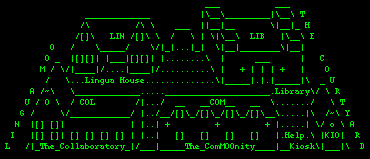To construct a community requires careful thought and planning. Our goal has always been to create a friendly and productive environment at Lingua. Thus, there are important reasons for the design of public space and for policy decisions that affect the status of all users. In essence, our aim was to minimize the "class" AND "room" effect that the MOO has on students and teachers. First, to reduce the distinguishing markers of "class" we decided not to append the word 'guest' to guests who log in to Lingua.
 Because we had chosen to allow undergraduates to log on as guests (due to computing resource limitations), rather than as players with their own accounts, we felt it important not to make them feel different. So, all guests log in with their own name, or some nickname they choose. Basically, when you scan the @who, you'll see people logged on, not guests and players. We also chose to make all residents of Lingua MOO automatically builders, unlike the policies of other educational MOOs.
Because we had chosen to allow undergraduates to log on as guests (due to computing resource limitations), rather than as players with their own accounts, we felt it important not to make them feel different. So, all guests log in with their own name, or some nickname they choose. Basically, when you scan the @who, you'll see people logged on, not guests and players. We also chose to make all residents of Lingua MOO automatically builders, unlike the policies of other educational MOOs.
In addition, we felt it necessary to make the public space of the MOO accessible to all players, especially the areas that housed research tools. In fact, in the HELP KIOSK off the main Courtyard at Lingua, we created some help text notes that can be read inside the Kiosk, or emailed to the player/guest.
| I was very impressed by the help materials. Even a newbie like me could get along fairly well after a couple of times. Derek McClure, student UT Dallas. |
One of these notes explains the special rooms at Lingua and their function. For example, we mention the Computer Room from which players may use a specially programmed webslate to do research on the WWW, and the GNA forum room where users may converse with other users at eighteen other MOOs. All in all, the accessibility to other MOOs and the WWW adds exponentially to the community dimension of Lingua MOO.